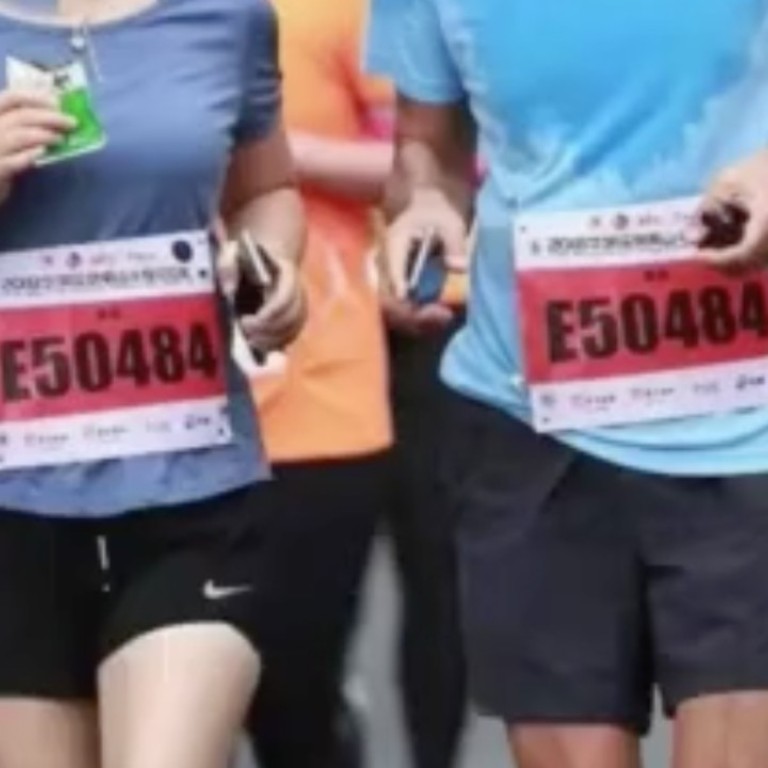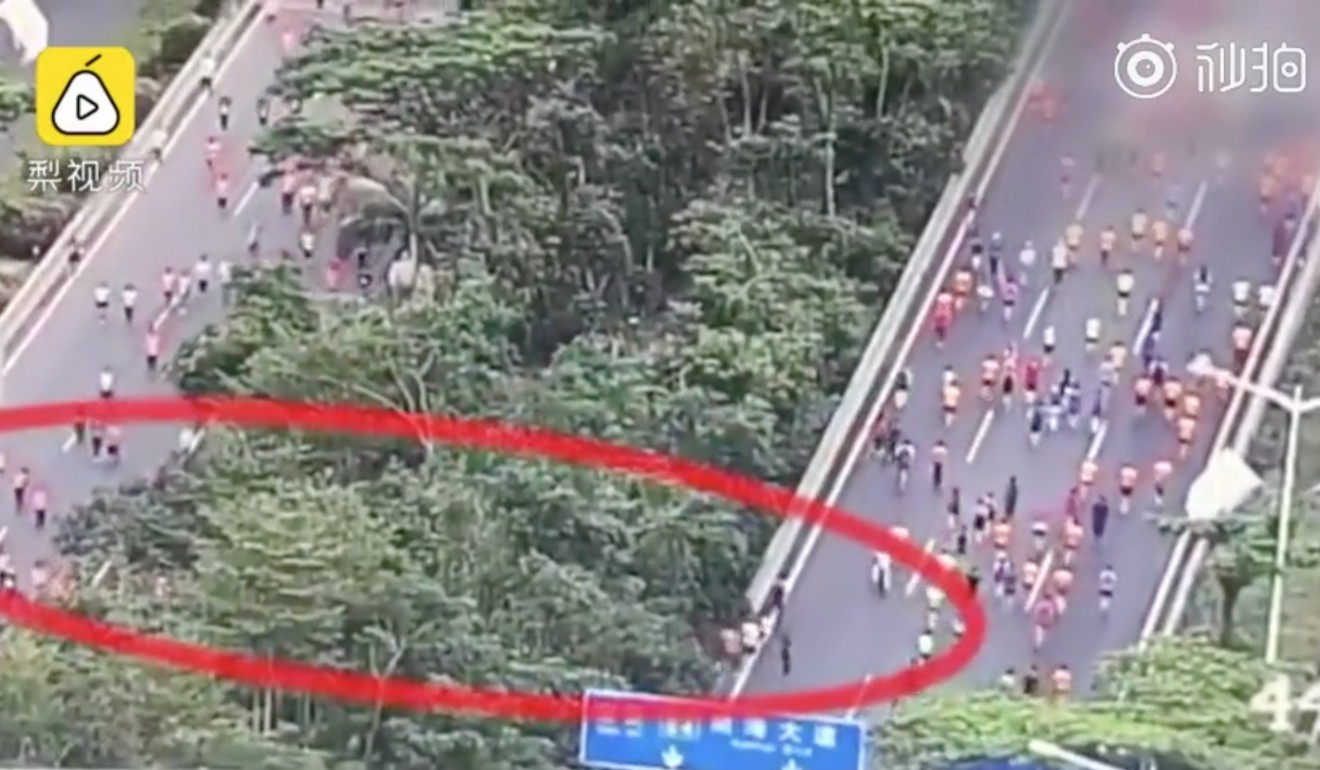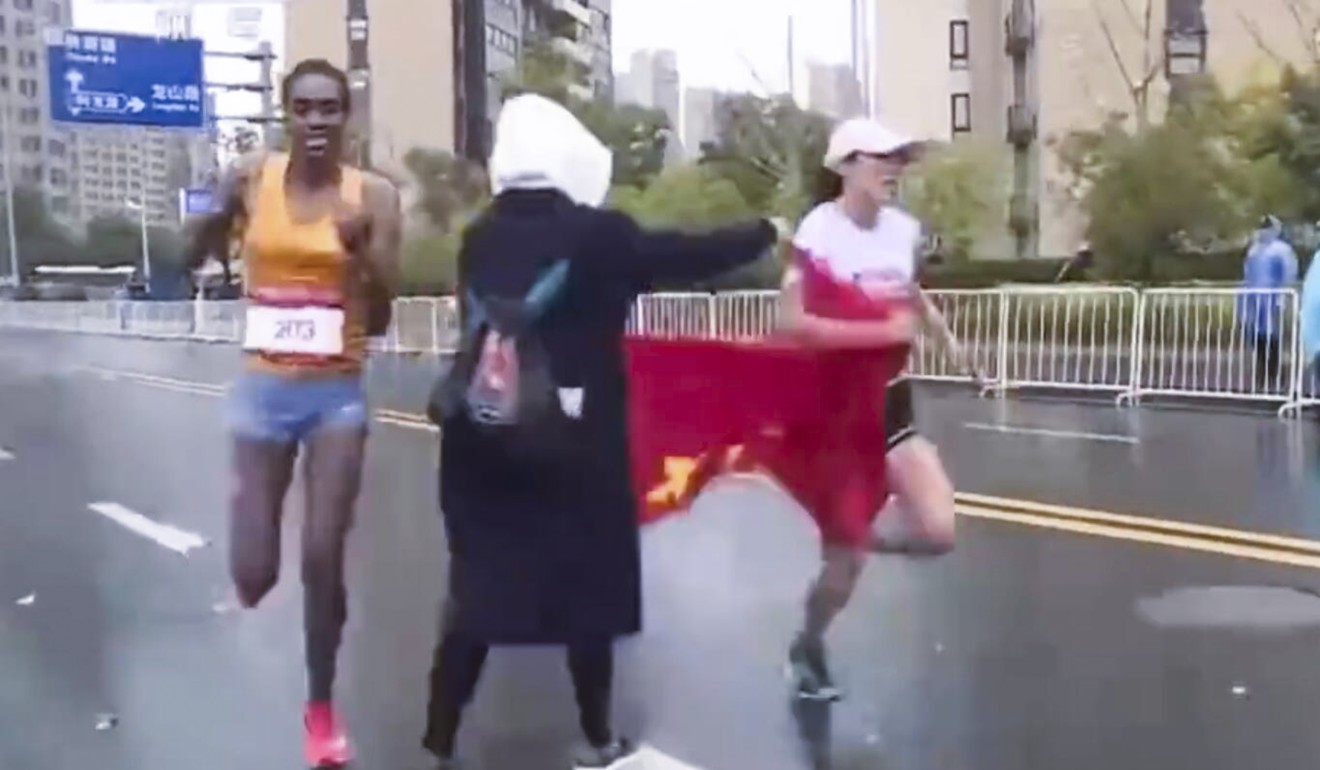
Rampant cheating and ill-advised patriotism: how China’s booming marathon industry became a magnet for ridicule
- Running craze set to make marathons in China a US$17 billion industry by 2020, with nearly 2,000 events a year and 10 million participants
- But mishaps continue to accompany the sport’s growth, from ‘impostor’ runners to short cuts to competitors being handed a flag at the wrong moment
Marathon running is booming as jogging fever sweeps China, from white-collar workers showing off their night-run times on social media to entry slots for races being snapped up seconds after they are released.
But with the sport’s popularity has come a wave of complaints and scandals as it fast-tracks into a lucrative industry in China.
At the end of November, the organisers of the Shenzhen Marathon said there had been large-scale cheating in their half-marathon, with 258 competitors being found to have cheated by posing as others, wearing fake bibs and taking short cuts.
Three impostors and 18 runners wearing fake bibs were barred from the annual event for life, while the other runners – who had been caught by traffic cameras, photographs and the timing chips they wore – were barred from the race for two years.
Hundreds face lifetime bans from Shenzhen Marathon after cheating scandal
“For runners, respecting the rules should be the bottom line of marathons, because there is no fairness without rules and competition is pointless without fairness,” Xinhua wrote in a commentary.
“Both runners and organisers should reflect on the meaning of taking part and running marathons. Don’t forget that during the run.”

On the same day, the Chinese Athletic Association (CAA) ordered marathon organiser China Run to strictly follow event rules and protocols and not to interfere with athletic competition, following the fiasco of a Chinese runner being impeded in the closing stages of a marathon by a member of staff trying to thrust a national flag into her hands, possibly costing her victory.
“Marathon organisers must take their responsibility to ensure the sports rules are above anything else to ensure events are held safely and smoothly,” CAA vice-president Wang Nan said in a statement on the association’s website that was directed at all race organisers, not only Run China.
Did this patriotic stunt cost a Chinese marathon runner victory?
After the officials’ rebuke, Run China organisers had to make improvements, including stopping the practice of handing a China flag to the winning runners in its most recent run on Tuesday, in Zhuji, east China’s Zhejiang province.
It had made headlines when He Yinli, who was leading the Suzhou Taihu Marathon in Jiangsu province, was impeded twice by event staff handing her a flag before taking it, dropping it – disrupting her breathing and pace – and being beaten by five seconds by Ethiopian runner Ayantu Abera Demisse.
The organisers sparked more public debate about patriotism and sport when they responded to the initial online outcry by saying that offering Chinese runners a flag before they crossed the finish line was a prearranged procedure for all Run China events, to “spread the main-theme propaganda”.

The scandals have showcased the growing pains of what has become a highly lucrative industry.
Beijing Marathon a victim of its own success as runners don fake tags
Organised marathon running in China has been surging, growing from 22 organised marathons in 2011 to 1,102 last year, with participant numbers almost doubling year on year in 2017 to 4.95 million.
More than 1,000 brands sponsored the events last year, including property and energy companies, banks, carmakers and jewellery makers.
A total of 21 companies were involved in the sponsorship of this year’s Beijing Marathon 2018, including real estate company Huxia Happiness, Adidas, Hyundai, Huaxia Asset Managemenet and KFC.
More than 720,000 people were directly employed in the industry last year, with a further 2 million indirectly employed, according to a report by the CAA. Its value is set to grow to 120 billion yuan (US$17.5 billion) by 2020, from 70 billion yuan last year, with 1,900 events and 10 million runners.
Despite its huge popularity, marathon running has not been without its problems and inexperienced runners have been known to underestimate the physical strain such long runs can have on the body.
At the 2016 Qingyuan Marathon in Guangdong province, more than 12,000 of the 20,000 runners received medical help for injuries such as muscle spasms.
More seriously, in the past four years, at least 15 people have died from heart attacks while running marathons in China.
More marathon drama in China as Ethiopian forced to a stop at finish line
Aside from the health risks, organisers have been trying to combat cheating in events.
Cao Fengying was disqualified and barred for six months for using a performance stimulant after finishing third in a marathon in Hubei in central China in March.
The same month, a pacemaker in the Sanya Marathon on the island of Hainan was disqualified and barred from the event for two years for completing 9km (5½ miles) of the course in a van.
In June, 25 runners in the Lanzhou Marathon in the northwestern Gansu province were either disqualified or barred for two years for posing as registered runners or carrying timing chips for other runners.
In October, three runners in the Xiangyang Marathon in Hubei were disqualified after one runner carried timing chips for the other two.
Cheating has not been the only issue. In September, during the Beijing Marathon, a male spectator was captured on camera touching the breast of a cheerleader. He said he was trying to give the woman a high-five but missed, and apologised.
In November, a man who ran a marathon in Xichang, in southwest China’s Sichuan province, was criticised for stuffing an excessive quantity of the free energy bars and supplies provided for runners into his socks and backpack, before bragging about it on social media. It was later found that others had done likewise.
Organisation of races has also been criticised as unprofessional. Runners finishing the 2016 Shanghai International Marathon found that their medals misspelled “international” as “internation”.
Last year, a marathon in Jinchang, in Jiangsu, caused a stir online because organisers had provided a toilet on the route that consisted of a piece of cloth tied between two trees, and the cloth was being blown up by the wind.

